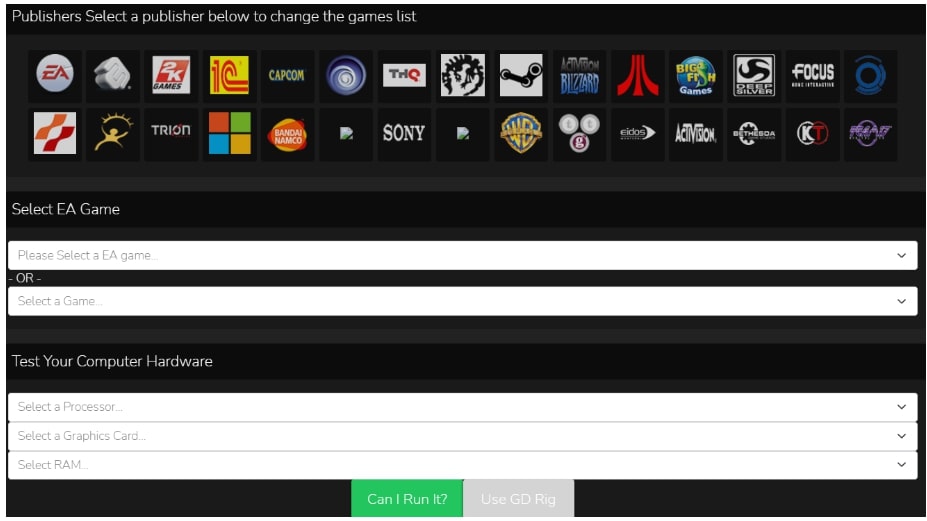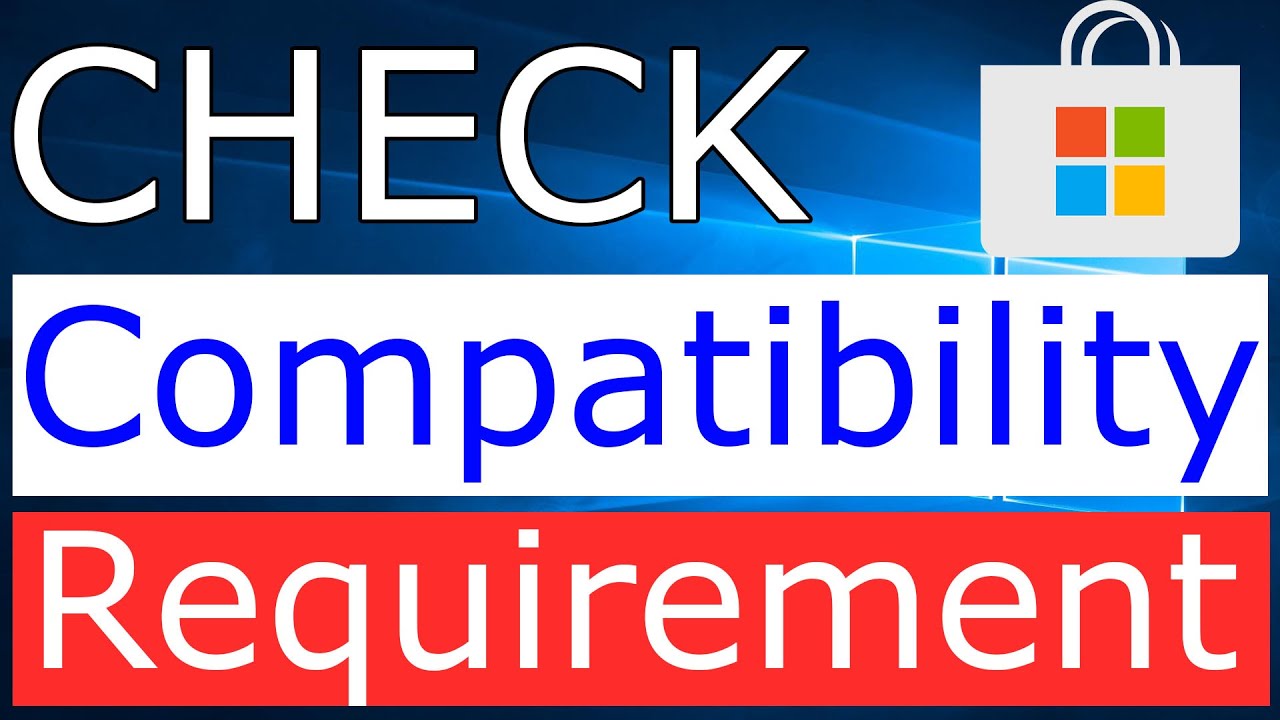Top Websites For Checking System Compatibility For Games And Software

Executive Summary

Frustrated with game crashes and software malfunctions? Tired of spending hours researching system requirements only to find your PC falls short? This comprehensive guide unveils the top websites dedicated to providing accurate and up-to-date system compatibility information for games and software. We’ll explore the features, strengths, and weaknesses of each, empowering you to make informed decisions before purchasing or installing anything new. Say goodbye to compatibility headaches and hello to seamless digital experiences. This guide will save you time, money, and frustration. Let’s dive in!

Introduction
Choosing new software or games can be exciting, but the dreaded compatibility check often casts a shadow over that enthusiasm. Spending money on a game only to find out your system can’t run it is incredibly disheartening. This article will help you avoid that pitfall. We’ll examine some of the best online resources that meticulously detail the minimum and recommended system requirements for thousands of games and software applications. Knowing these requirements beforehand will ensure a smooth and enjoyable digital experience, saving you time and potential headaches. Let’s get started and discover how to confidently check compatibility before you buy or download anything.
Frequently Asked Questions (FAQs)
Q: Why is checking system compatibility important?
A: Checking system compatibility is crucial to avoid wasting money on software or games that your computer cannot run. It prevents frustrating errors, crashes, and poor performance, ensuring a smooth and enjoyable user experience.
Q: What information do these websites typically provide?
A: These websites generally provide detailed system requirements, including minimum and recommended specifications for operating systems, processors, RAM, graphics cards, and storage space. Some also include information about peripheral compatibility (e.g., controllers).
Q: Are these websites always 100% accurate?
A: While these websites strive for accuracy, system requirements can sometimes be inaccurate or change with updates. It’s always best to treat the information as a guideline and consider other user reviews or forums for additional insights.
System Requirements Labs (Can You RUN It?)
System Requirements Lab’s “Can You RUN It?” is a leading website for checking system compatibility. Its user-friendly interface allows you to quickly search for games and software and see if your system meets the minimum or recommended requirements. The website offers a detailed breakdown of your system’s specifications and compares them to the game or software’s requirements. It provides a clear “Yes,” “No,” or “Maybe” verdict, along with explanations if your system is lacking in certain areas.
- Ease of Use: The intuitive search and straightforward results make it incredibly easy to use, even for tech novices.
- Comprehensive Database: It boasts an extensive library of games and software titles.
- Detailed Analysis: It provides a comprehensive comparison between your system specs and the requirements.
- Multiple System Checks: You can check compatibility across multiple systems if you have more than one PC.
- Regular Updates: The database is frequently updated to reflect the latest software and game releases.
PCGamingWiki
PCGamingWiki is a community-driven website that provides in-depth information on PC game compatibility. It’s known for its accuracy, detail, and extensive troubleshooting sections. This wiki offers more than just minimum and recommended requirements; users often contribute additional insights, fixes for common problems, and compatibility information for various hardware configurations. The collaborative nature of the wiki ensures that information is regularly updated and vetted by fellow gamers.
- Community-Driven Accuracy: Information is curated and verified by a community of PC gamers, resulting in higher accuracy.
- Troubleshooting Guides: The wiki often includes troubleshooting steps for known compatibility issues.
- Extensive Detail: It provides detailed information, going beyond basic system requirements.
- Mod Compatibility: Many entries include information on mod compatibility and potential conflicts.
- Multiple Game Versions: Entries often detail compatibility with various game versions and patches.
Steam
Steam, the giant digital distribution platform for PC games, often provides system requirements directly on the game’s store page. While not solely dedicated to compatibility checks, it’s a crucial resource due to its vast library and ease of access. After searching for a game, you will find the minimum and recommended system requirements clearly listed, allowing you to quickly assess its suitability for your system before purchasing.
- Direct Access: System requirements are directly integrated into the game’s store page on the platform.
- Vast Library: Covers an enormous range of PC titles.
- User Reviews: Steam user reviews often mention compatibility issues, offering valuable real-world perspectives.
- Easy Access: If you intend to buy the game on Steam, this is the most convenient place to check.
- Platform Integration: Seamlessly integrated into your existing gaming workflow on the platform.
Other Game Stores (Epic Games Store, GOG, etc.)
Other major game stores, such as the Epic Games Store and GOG, similarly provide system requirements on their individual game pages. While their databases are not as extensive as Steam’s, they are valuable for games they exclusively or primarily distribute. The availability of system requirements within the purchasing platform directly eliminates the need for external checking.
- Game-Specific Information: Offers reliable compatibility data for titles found on their platform.
- Convenience: Eliminates the need for separate website checks when browsing within the store.
- Direct Purchase Link: Allows immediate purchase if the game meets the system specifications.
- Store-Specific Deals: Might offer better deals on the game, if available.
- Platform-Specific Features: May highlight features or integration specific to the platform.
Software Vendor Websites
For software applications, checking the official website of the software vendor is often the best source of information. Most reputable software companies provide detailed system requirements on their product pages. This ensures you’re getting the most accurate and up-to-date information directly from the source.
- Official Information: Guarantees the information comes directly from the developer.
- Specific Requirements: Can include requirements for specific features or functionalities.
- Up-to-Date Details: The most likely source to include any recent updates to the application’s requirements.
- Contact Support: Provides easy access to customer support if you have any compatibility-related questions.
- Licensing Information: May include details on license agreements or compatibility with other software.
Conclusion
Navigating the world of PC gaming and software can be daunting, but armed with the knowledge of these essential compatibility-checking websites, you can confidently approach any purchase. By utilizing the resources outlined above—from the user-friendly interface of System Requirements Lab to the detailed information on PCGamingWiki and the convenience of Steam—you can ensure a smooth and enjoyable digital experience, saving yourself countless hours of frustration and potential financial losses. Remember that while these tools are incredibly helpful, always consider user reviews and forum discussions for additional perspectives. Happy gaming!
Keywords
System compatibility, game compatibility, software compatibility, PC gaming, system requirements



